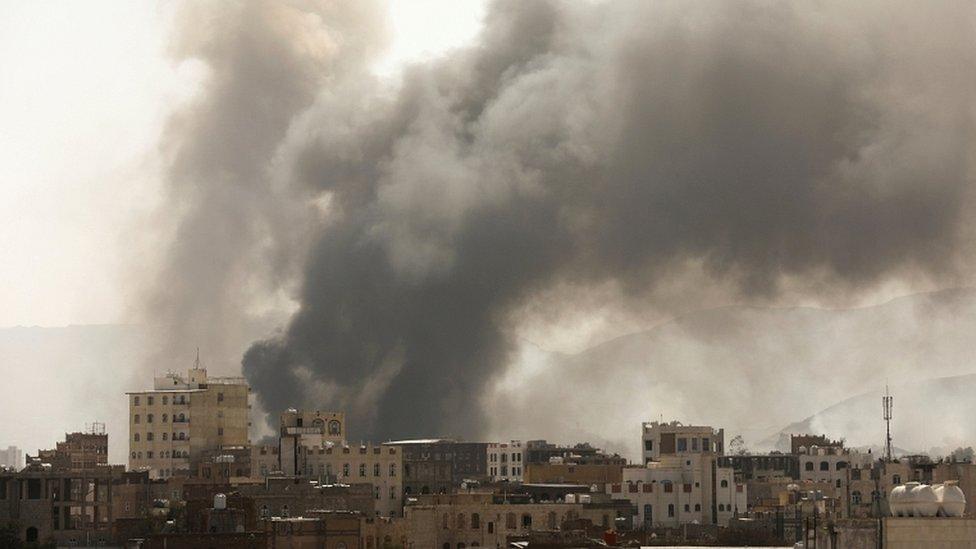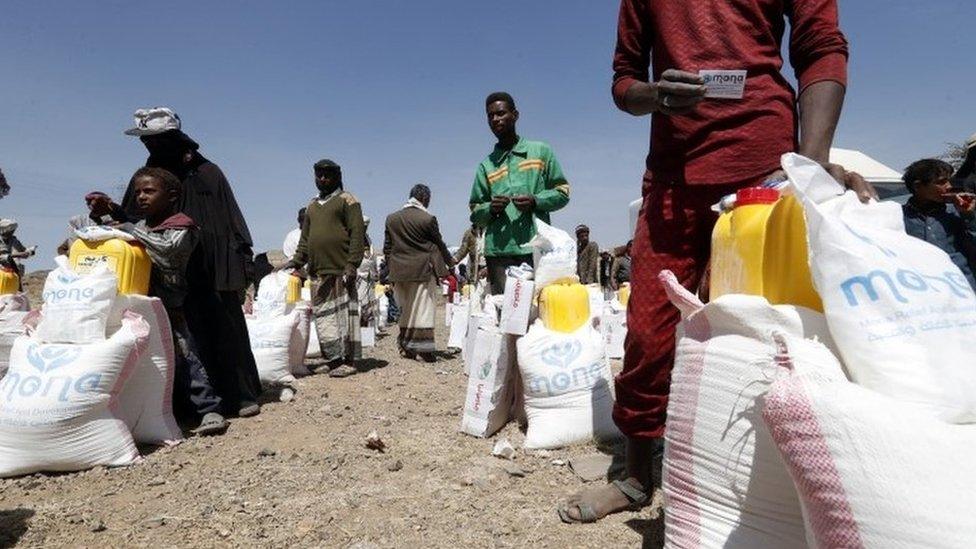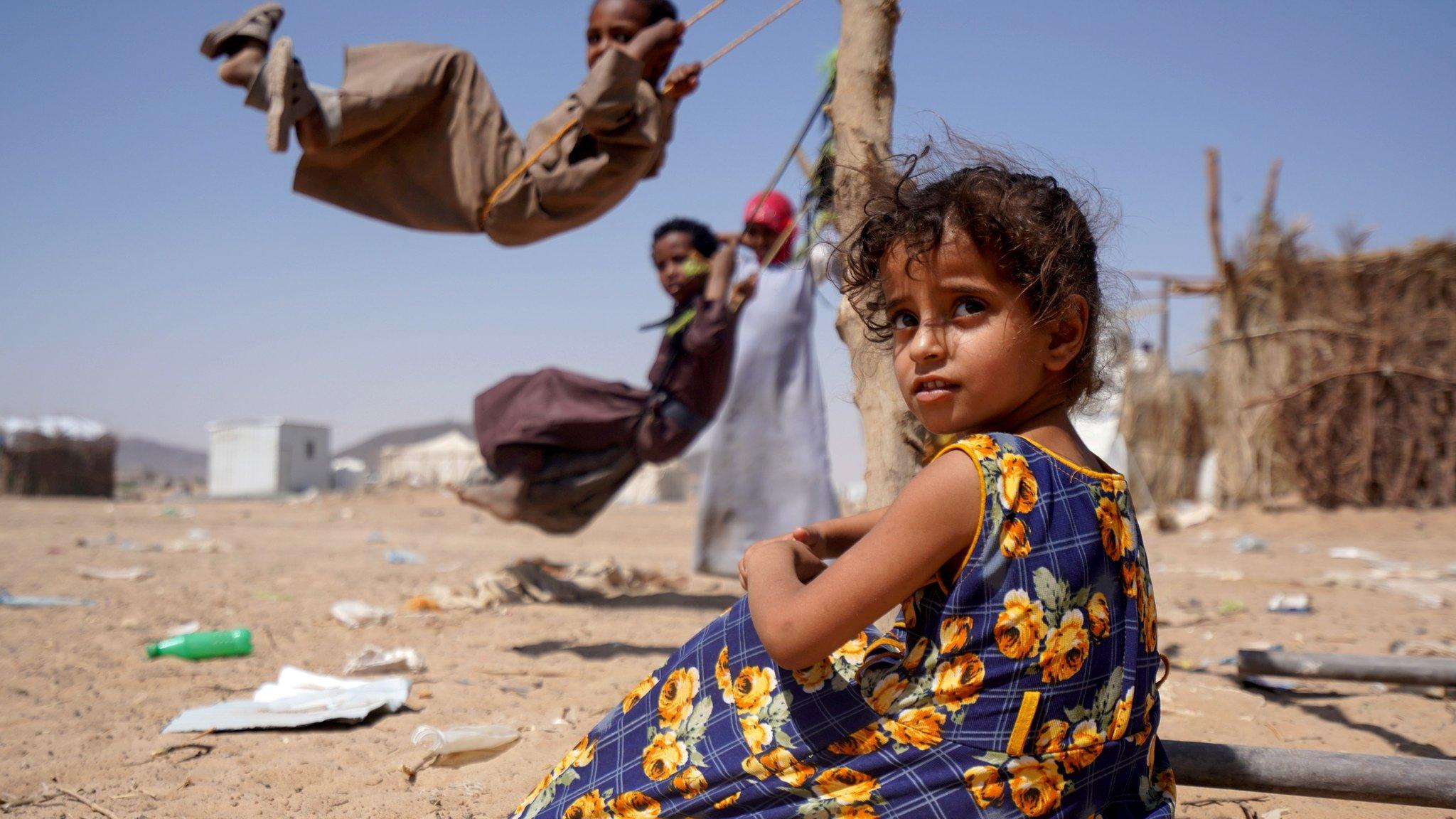Yemen conflict: Saudi Arabia puts forward peace plan
- Published

There have been Saudi-led air strikes of the capital, Sanaa, which under Houthi control
Saudi Arabia has proposed a new peace plan to end nearly six years of war in Yemen.
It suggests a UN-supervised ceasefire between Yemen's Saudi-backed government and Houthi rebels, who are supported by Iran.
The plan also includes the reopening of vital air and sea links, and the start of political negotiations.
Houthi rebels have said the offer did not appear to go far enough to lift the air and sea blockade in place.
The proposal was announced in the Saudi capital, Riyadh, by Saudi Foreign Minister Prince Faisal bin Farhan, who called on the Houthis, who control large swathes of Yemen, to accept it.
He said the ceasefire would come into force as soon as the Houthis accepted it.
Yemen's internationally recognised government has welcomed the offer, but the Houthis have said the initiative provided "nothing new", and fell short of their demand for a complete lifting of the blockade on the airport in the capital, Sanaa, and the western port of Hudaydah.
"We expected that Saudi Arabia would announce an end to the blockade of ports and airports and an initiative to allow in 14 ships that are held by the coalition," Houthi chief negotiator Mohammed Abdulsalam told Reuters news agency.
The group would continue to talk with the Saudis, the US and mediator Oman for a peace agreement, he said.
Yemen: Death by war or pandemic
Saudi officials say they are co-ordinating their steps with the United Nations and the United States, which have also stepped up their efforts to end a conflict which has created the world's worst humanitarian crisis.
Only days ago, the Houthis rejected a US plan for a nationwide ceasefire.


A peace plan is already in the works; international diplomacy has been quietly accelerating for months. A push by UN envoy Martin Griffiths was recently bolstered by US President Joe Biden's new focus on ending this war, and the appointment of US special envoy Tim Lenderking to help make it happen.
Riyadh's decision to make its own public statement underscores how it backs this effort to find a way out of this destructive conflict. And it wants to ensure it's being seen to do so. If these new moves don't work, the blame would lie with the Houthis. It could also help confirm the kingdom was in lockstep with its American ally, especially when that relationship is still strained over the murder of journalist Jamal Khashoggi.
Riyadh's new concessions, including the opening of vital air and sea links, will help ease the enormous suffering of Yemenis. They are also longstanding Houthi demands.
This intensifying diplomacy also competes with the Houthis' drive for battlefield gains, including the capture of the strategic town of Marib. Western diplomats express hope that this now-stalled offensive could provide a window to accelerate efforts on the negotiating front. But it won't be easy.
Iran, which backs the Houthis, may also see an opportunity to burnish its own peace-making credentials. Whatever brings the warring sides to the table will be welcomed by an exhausted people on the brink of famine in this endless war.

The Saudi offer coincides with increasing drone and missile attacks by Houthi rebels on Saudi energy and security infrastructure.
There's also been renewed bombing by the Saudi-led coalition of Sanaa, which is under Houthi control.
Many previous peace plans for Yemen have failed, including last year's Saudi ceasefire. But the kingdom is now offering some concessions the Houthis have long called for, including the opening of the international airport in Sanaa, currently under Houthi control, although the Saudi-led coalition controls the airspace.
If the warring sides agree to a ceasefire, it would be supervised by the UN and help pave the way for peace talks.
The two sides are still far apart, but this is the most concerted effort to try to bring them together, the BBC's chief international correspondent Lyse Doucet says.
The conflict began in late 2014, when rebels seized control of much of the west of the country and a Saudi-led coalition of Arab states launched a military operation to restore President Abdrabbuh Mansour Hadi's rule.


Riyadh led a military coalition into the country in 2015 to prop up the internationally recognised government, but it has struggled to oust the rebels.
An estimated 20 million people - two-thirds of the Yemeni population - depend on humanitarian assistance. Some two million children are acutely malnourished.
In addition to conflict, Yemen has seen a collapse of its health system, leaving it incapable of coping with the coronavirus pandemic.
Related topics
- Published2 March 2021

- Published25 February 2021
